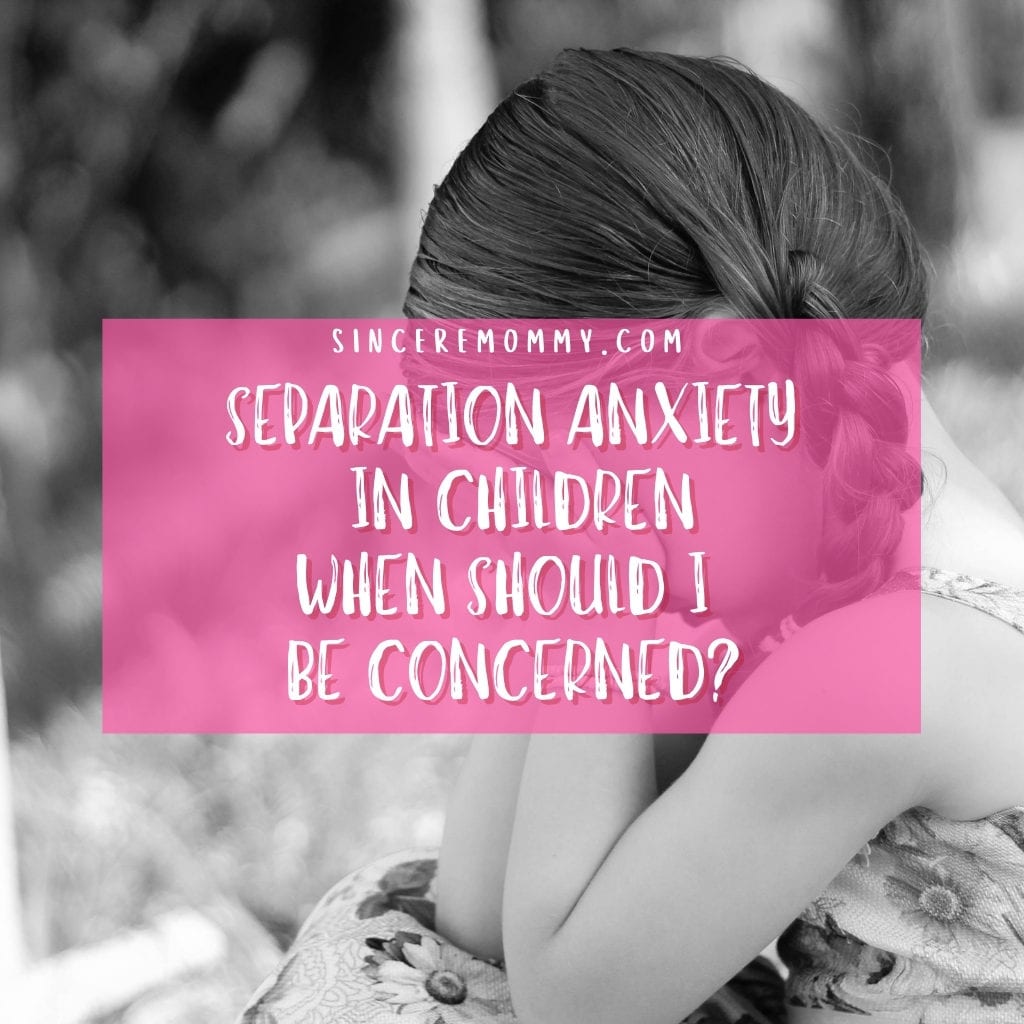Many of us have heard the phrase “separation anxiety” used loosely to describe a response by a child who misses their parents. Many children aged 8-14 months old often go through a phase of being fearful of strangers and new places.
When this happens, it is considered to be completely normal. At this age, everything is new to behold. Imagine being brand new in the world and dragged into all the hustle and bustle of a busy Supermarket. Anyone would feel a bit hesitant about the new experience.
However, if the child is over 6 years of age, they may have Separation Anxiety Disorder, especially if this behavior lasts for more than 4 weeks.
Table of Contents
What is Separation Anxiety Disorder Really?
Separation Anxiety Disorder is when a child becomes fearful and nervous when they are away from their home. It also occurs when the child is scared to be away from a loved one, such as a parent or caregiver.
Sometimes there are very real symptoms involved. The symptoms could be in the form of headaches or stomach aches when even the thought of being separated arises. This problem is increasingly more serious when the separation anxiety begins to interfere with the child’s day. It can disrupt school or the ability to play with other children.
Children will often find themselves worried that if they leave their parent/caregiver something bad will happen. Often the anxiety begins with thoughts like: What if Grandma doesn’t pick me up from school? What if I get lost? What if I get kidnapped? These thoughts can quickly cause the child to feel extremely upset and uneasy.
Separation Anxiety In Children – What Children Are Affected?
This disorder affects at least 4% of children through any school year. Anxiety itself often peaks at certain developmental points in a child’s life, such as when they begin kindergarten, middle school, or high school.
This condition can often lead children to miss opportunities, such as not wanting to go on field trips because they are too worried about missing their loved ones. Often, the child will have poor attendance due to feeling ill from anxiety. There are many ways this disorder can affect children. Identifying and discerning this disorder from normal clinginess is key to treating it properly.
Creating a Safe and Comforting Environment
Creating a safe and comforting environment can help children feel more secure during separations. Provide familiar objects, such as a favorite blanket or stuffed animal, that can comfort and reassure them in your absence. Establishing a goodbye routine, such as giving hugs and kisses or singing a special song, can help children feel more connected to their caregivers during separations.
Open Communication and Validation
Open communication and validation are essential for helping children navigate their feelings of anxiety and insecurity. Encourage your child to express their emotions openly and validate their feelings by acknowledging their fears and providing empathy and understanding. Avoid minimizing or dismissing your child’s feelings, as this can undermine their sense of security and trust.
Building Trust and Confidence
Building trust and confidence is crucial for helping children overcome separation anxiety. Be consistent and reliable in your interactions with your child, following through on promises and commitments. Encourage independence and autonomy by providing opportunities for your child to make choices and take on age-appropriate responsibilities.
Seeking Professional Support When Needed
In some cases, separation anxiety may persist or interfere with a child’s daily functioning, requiring professional support. If your child’s anxiety significantly impacts their ability to participate in school, social activities, or daily routines, consider seeking guidance from a pediatrician, therapist, or mental health professional. They can provide assessment, support, and intervention strategies to help your child manage their anxiety effectively.
Supporting Parents and Caregivers
Finally, it’s essential to recognize that separation anxiety can also be challenging for parents and caregivers. Seek support from other parents, family members, or support groups who can offer empathy, encouragement, and practical advice. Remember to prioritize self-care and seek help when needed to ensure that you can effectively support your child through this development phase.
Empowering Coping Skills
Empowering your child with coping skills can help them manage their anxiety more effectively. Teach your child relaxation techniques such as deep breathing, visualization, and progressive muscle relaxation to help them calm down when they’re feeling anxious. Encourage your child to express their feelings through art, music, or journaling, providing them with healthy outlets for processing their emotions. Practice positive self-talk with your child, helping them reframe negative thoughts and build resilience in the face of adversity.
Celebrating Progress and Success
Finally, celebrate your child’s progress and success in overcoming separation anxiety. Recognize their bravery and resilience in facing their fears and taking steps towards independence. Praise your child for their efforts, no matter how small, and acknowledge their accomplishments with words of encouragement and affection. By celebrating your child’s progress and success, you can boost their confidence and motivation to continue working towards overcoming their anxiety and thriving in new experiences.
How Can Separation Anxiety In Children Be Treated?
Children may need to have some form of therapy regarding their disorder. Be sure to listen to the child and respect the child’s feelings. This is of key importance. Listening to the child and accepting what he or she has to say may have more of a healing effect than you’d think.
Try to be as empathetic as possible with the child. Remind them that there have been many times when you have been separated and that everything was just fine. Explain to your child that this time will be no different. Do your best to show your child how you can be calm in the face of separation. In turn, the child may do the same.
If your child becomes comfortable enough to participate in activities, PRAISE THEM! Reward them for being involved and not too scared to try something new. This is a huge stepping stone to becoming more independent.
Encourage Independence
Encouraging a child to be independent is sometimes difficult for parents. Surprisingly, many parents tend to become overbearing and overprotective of their children. This excessive sheltering can sometimes hinder the child’s desire to become independent.
It is up to us as parents to let go at times (even though it seems extremely hard). This will allow our children to leave their comfort zone and gain new experiences. Oftentimes, parents do not see that they are sheltering their children too much.
I myself tend to want to protect my child from even the simplest of situations. It is easy to understand why a parent would be nervous and perhaps overly protective, especially if their child is starting school or has a new friend they would like to visit.
Be a part of the solution, not the problem.
Changing a routine is hard. I am not a fan of change and do not want to start something new or leave my comfort zone. Consider what you, as a parent, have done to contribute to your child’s anxiety. Perhaps there are things you could do differently.
While this may not always be the case, it is possible for some. Evaluate your own personal situation. Encourage your child to try new things and do your best not to pull them back from them. Test the waters. If you are not very comfortable with this step, then start small.
Allow them to spend a slightly longer time than usual playing at the park with other children, let them join the extracurricular activities they like, and encourage them to follow their dreams. When they ask to do something you aren’t sure about, give it some extra thought before you tell them no. Give in to change in your routine, your child may benefit from it.
Put Yourself In Their Shoes
Also, kids need reassurance from time to time when they are feeling upset. When you wonder why a child behaves a certain way, put yourself in their shoes. Then, imagine how you would like to be treated in that situation.
Next, try to understand that separation anxiety in children is very serious. Show compassion when handling a child who is experiencing these types of feelings.
Offering Reassurance and Support
Offering reassurance and support is essential for helping your child cope with separation anxiety. Let your child know that it’s normal to feel scared or anxious sometimes and that you support them through their feelings. Provide plenty of hugs, cuddles, and verbal reassurance to help your child feel safe and loved. Remind your child that separations are temporary and that you will always return to them, reinforcing their sense of security and trust in your relationship.
Take serious action when needed.
Finally, keep an open mind in the future and give your child the encouragement they need. Talk to your child about their fears and be understanding. Hear them out! If the problem persists and becomes debilitating for your child for an extended period, be sure to contact a medical professional.
– Sincere Mommy
If you liked this post, you may also like this one.

